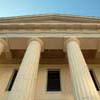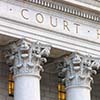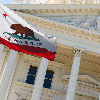School District Need Not Accommodate Coach's Request to Publicly Pray at Football Games

October 2017
Number 58
A Washington school district was not required to allow a high school football coach to pray on the 50-yard line at the end of each game, the Ninth Circuit Court of Appeals ruled in Kennedy v. Bremerton School District (9th Cir. 2017, No. 16-35801) ___F.3d___ <http://cdn.ca9.uscourts.gov/datastore/opinions/2017/08/23/16-35801.pdf>. The court found that the District did not violate the coach's First Amendment rights by placing him on administrative leave for refusing to cease his demonstrative prayer after football games.
Background
Joseph Kennedy coached football in the Bremerton School District from 2008 to 2015. During his first coaching season, Kennedy began praying at the end of each football game. After a few games, players started to join Kennedy. Eventually, Kennedy began giving short motivational speeches with religious content following each game.
In September 2015, the District learned of Kennedy's prayers and speeches and asked him to limit his speeches to non-religious topics to avoid offending any players. The superintendent told Kennedy he could still engage in private, non-demonstrative prayer.
Following the District's request, Kennedy began giving non-religious post-game speeches and praying only after everyone had left the stadium. After several weeks of this practice, Kennedy asked the District to allow him to resume praying on the field after each game. The District reiterated that Kennedy could pray in private before or after the games, but that he could not engage in demonstrative religious activity observable by students and the public attending the games. Kennedy refused to comply with the District's instruction and engaged in demonstrative prayer during the next two games. The District placed Kennedy on paid administrative leave. The football players did not continue to pray on their own after the football games.
Several months later, Kennedy sued the District, asking the trial court to require the District to reinstate him as a football coach and allow him to pray on the 50-yard line immediately after each football game. The Ninth Circuit upheld the trial court's ruling that the District did not did not have to reinstate Kennedy or permit him to engage in demonstrative public prayer immediately after the games.
Takeaways
Public employees retain their First Amendment free speech rights when speaking as private citizens. But "when public employees make statements pursuant to their official duties," the United States Supreme Court held in its landmark 2006 ruling in Garcetti v. Ceballos, "the employees are not speaking as citizens for First Amendment purposes, and the Constitution does not insulate their communications from employer discipline." In Kennedy, the Ninth Circuit found that Kennedy spoke as a public employee-and not as a private citizen-because he prayed "immediately after games while in view of parents and students." The court found that this activity fell within the scope of Kennedy's official duties because in his role as a sports coach, Kennedy served as a mentor and role model for student athletes.
The Ninth Circuit's ruling highlights that a public school may limit demonstrative religious speech of an employee who serves as a student mentor and role model. The court suggested that this same rule applies to teachers, and this analysis also likely applies to counselors and other employees who serve as role models to students. Nevertheless, the court indicated that a public school employee has the right to pray or otherwise practice religion while in private, even if on school grounds.
Kennedy does not address whether a district may limit religious speech of other employees (janitors or cafeteria workers, for example) who have more limited and discrete interactions with students. Additionally, while one judge wrote separately to explain his view that the District could limit Kennedy's public prayers to avoid the appearance of endorsing a particular religion, Kennedy does not address whether a district violates the Establishment Clause by permitting or failing to limit an employee's demonstrative religious speech.
If you have any questions about the Kennedy decision or employees' religious speech rights in general, please contact the authors of this Client News Brief or an attorney at one of our eight offices located statewide. You can also visit our website, follow us on Facebook or Twitter or download our Client News Brief App.
Number 58
A Washington school district was not required to allow a high school football coach to pray on the 50-yard line at the end of each game, the Ninth Circuit Court of Appeals ruled in Kennedy v. Bremerton School District (9th Cir. 2017, No. 16-35801) ___F.3d___ <http://cdn.ca9.uscourts.gov/datastore/opinions/2017/08/23/16-35801.pdf>. The court found that the District did not violate the coach's First Amendment rights by placing him on administrative leave for refusing to cease his demonstrative prayer after football games.
Background
Joseph Kennedy coached football in the Bremerton School District from 2008 to 2015. During his first coaching season, Kennedy began praying at the end of each football game. After a few games, players started to join Kennedy. Eventually, Kennedy began giving short motivational speeches with religious content following each game.
In September 2015, the District learned of Kennedy's prayers and speeches and asked him to limit his speeches to non-religious topics to avoid offending any players. The superintendent told Kennedy he could still engage in private, non-demonstrative prayer.
Following the District's request, Kennedy began giving non-religious post-game speeches and praying only after everyone had left the stadium. After several weeks of this practice, Kennedy asked the District to allow him to resume praying on the field after each game. The District reiterated that Kennedy could pray in private before or after the games, but that he could not engage in demonstrative religious activity observable by students and the public attending the games. Kennedy refused to comply with the District's instruction and engaged in demonstrative prayer during the next two games. The District placed Kennedy on paid administrative leave. The football players did not continue to pray on their own after the football games.
Several months later, Kennedy sued the District, asking the trial court to require the District to reinstate him as a football coach and allow him to pray on the 50-yard line immediately after each football game. The Ninth Circuit upheld the trial court's ruling that the District did not did not have to reinstate Kennedy or permit him to engage in demonstrative public prayer immediately after the games.
Takeaways
Public employees retain their First Amendment free speech rights when speaking as private citizens. But "when public employees make statements pursuant to their official duties," the United States Supreme Court held in its landmark 2006 ruling in Garcetti v. Ceballos, "the employees are not speaking as citizens for First Amendment purposes, and the Constitution does not insulate their communications from employer discipline." In Kennedy, the Ninth Circuit found that Kennedy spoke as a public employee-and not as a private citizen-because he prayed "immediately after games while in view of parents and students." The court found that this activity fell within the scope of Kennedy's official duties because in his role as a sports coach, Kennedy served as a mentor and role model for student athletes.
The Ninth Circuit's ruling highlights that a public school may limit demonstrative religious speech of an employee who serves as a student mentor and role model. The court suggested that this same rule applies to teachers, and this analysis also likely applies to counselors and other employees who serve as role models to students. Nevertheless, the court indicated that a public school employee has the right to pray or otherwise practice religion while in private, even if on school grounds.
Kennedy does not address whether a district may limit religious speech of other employees (janitors or cafeteria workers, for example) who have more limited and discrete interactions with students. Additionally, while one judge wrote separately to explain his view that the District could limit Kennedy's public prayers to avoid the appearance of endorsing a particular religion, Kennedy does not address whether a district violates the Establishment Clause by permitting or failing to limit an employee's demonstrative religious speech.
If you have any questions about the Kennedy decision or employees' religious speech rights in general, please contact the authors of this Client News Brief or an attorney at one of our eight offices located statewide. You can also visit our website, follow us on Facebook or Twitter or download our Client News Brief App.
As the information contained herein is necessarily general, its application to a particular set of facts and circumstances may vary. For this reason, this News Brief does not constitute legal advice. We recommend that you consult with your counsel prior to acting on the information contained herein.







